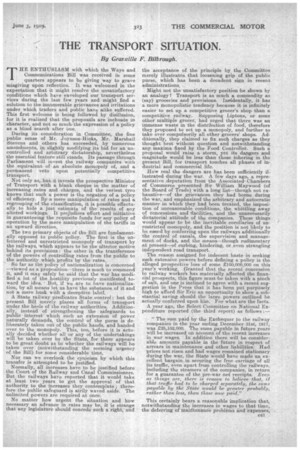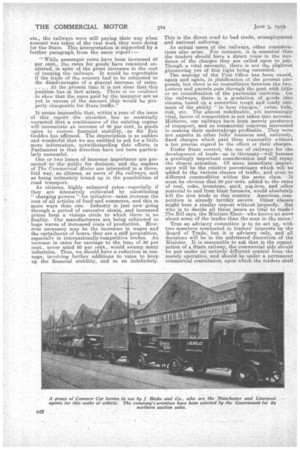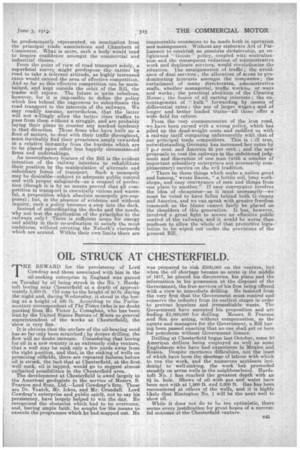T HE ENTHUSIASM with which the Ways and Communications Bill was
Page 15

Page 16

Page 17

If you've noticed an error in this article please click here to report it so we can fix it.
received in some quarters appears to be giving way to grave misgiving upon reflection. It was welcomed in the expectation that it might resolve the unsatisfactory conditions which have enveloped our transport services during the last few years and might find a solution to the innumerable grievances and irritations under which traders and public have alike suffered. This first welcome is being followed by disillusion, for it is realized that the proposals are inchoate in character, and not so much the expression of a policy as a blind search after one.
During its consideration in Committee, the fine public sense of Mr. Joynson-Hicks, Mr. Marshall Stevens and others haw succeeded, by numerous amendments, in slightly modifying its bid for an uncontrolled and arbitrary dictatorship, nevertheless the essential feature still stands. Its passage through Parliament will invest the railway companies with the equivalent of an absolute monopoly of, arid a permanent veto upon potentially competitive transport.
Not only so, but it invests the prospective Minister of Transport with a blank cheque in the matter of increasing rates and charges, and the veriest tyro knows that such a power is the negation of a policy of efficiency. By a mere manipulation of rates and a regrouping of the classification, it is possible effectually to hide a just estiniate of the results of any altered workings. It prejudices effort and initiative in guaranteeing the requisite funds for any policy of operation by the mere manipulation of the tariffs in an upward direction.
The two primary objects of the Bill are fundamentally opposed to public policy. . The first is the unfettered and unrestricted monopoly of transport by the railways, which appears to be the ulterior motive behind its provisions : the other is the transference of the powers of controlling rates from the public to the authority .which profits by the rates.
So far as the policy of nationalization is concerned —viewed as a proposition—there is much to commend it, and it may safely be said that the war has modified .a lot of the hostility previously manifested toward the idea. • But, if we are to have nationalization, by all means let us have the substance of it and not a mere husk with a deceptive label.
A State railway predicates State control : but the present Bill merely places all forms of transport under the heels of the railway authorities. Additionally, instead of strengthening the safeguards to public interest which such an extension of power naturally demands, the control of the purse is deliberately taken out of the public hands, and handed over to the monopoly. This, too, before it is actually decided whether all or any of the undertakings will be taken over by the State, for there appears to be great doubt as to whether the railways will be taken over (notwithstanding the seeming urgency of the Bill) for some considerable time, Nor can we overlook the cynicism by which this transfer is attempted to be justified.
Normally, all increases have to be justified before the Court of the Railway and Canal Commissioners. But the railways have reported that it would take at least two years to get the approval of that authority to the increases they contemplate ; therefore the public safeguard is airily waved aside. The unlimited powers are required at once. No matter how urgent the situation and how necessary an advance in rates may be, it is strange that any legislature should concede such a right, and the acceptance of the principle by the Committee merely illustrates that loosening grip of the public purse, which has been a decadent sign in recent administrations.
Might not the unsatisfactory position be shown by an analogy ? Transport is as much a commodity as (say) groceries and provisions. Incidentally, it has a more monopolistic tendency because it is infinitely easier to set up a competitive grocer's shop than a competitive railway. Supposing Liptons, or some other multiple grocer, had urged that there was an immense waste in the distribution of food, therefore they proposed to set up a monopoly, and further to take over compulsorily all other grocers' shops. Additionally, they claimed to fix such charges as they thought best without question and notwithstanding any maxima fixed by the Food Controller. Such a proposal would raise a storm, yet its dangers and magnitude would be less than those inhermg hi the present Bill, for transport touches all phases of industrial and commercial life.
How real the dangers are has been sufficiently illustrated during the war. A few days ago, a representative ,deputation from the AssociatedChambers of Commerce presented Sir William Maywood (of the Board of Trade) with a long list—though not exhaustive—of the grievances they had borne during the war, and emphasized the arbitrary and autocratic manner in which they had been treated, the imposition of unreasonable conditions, the whittling away of concessions and 'facilities, and the unnecessarily dictatorial attitude of the companies. These things would appear to be the inevitable corollaries of unrestricted monopoly, and the position is not likely to be eased by conferring upon the railways additionally the control of canals, the supervision and management of docks, and the means—though rudimentary at present—of curbing, hindering, or even strangling independent road transport.
The reason assigned for indecent haste in seeking such extensive powers before defining a policy is the alleged prospective loss of some 2100,000,000 on this year's working. Granted that the recent concession to railway workeis.ss has materially affected the financial prospects, this figure must be taken with a pinch of salt, and one is inclined to agree with a recent suggestion in the Press that it has been put purposely high to afford Sir Eric an opportunity to show a substantial saving should the large powers outlined be actually conferred upon him. For what are the facts.
A year ago, the Select Committee on National Expenditure reported (the third report) as follows :— " The sum paid by the Exchequer to the railway companies in the year ending December 31st, 1917, was 25,152,000. The sums _payable in future years will be increased on account of the recent increases in war wages. In addition there will be Considerable amounts payable in the future in respect of arrears in maintenance and other liabilities. Had prices not risen and had wages remained stationary during the war, the State would have made an excellent bargain in securing the free carriage of all its traffic, even apart from controlling the railways, including the steamers of the companies, in return for a guarantee of the pre-war net receipts. Even as things are, there is reason to believe that, if that.traffic had to be charged separately, Me sums payable by the State mould be greater probably, rather than less, than those now paid."
This certainly bears a reasonable implication that, notwithstanding the increases in wages to that time, the deferring of inairitenance problems and expenses, 041 etc., the railways were still paying their way when account was taken of the yast work they were doing for the State. This interpretation is supported by a further paragraph from the same report
" While passenger rates have been increased 50 per cent., the rates for goods have remained unaltered, in spite of the great increases in the cost of running the railways. It would be regrettable if the trade of the country hadto be subjected to the disadvantages of -a general increase of rates. . . . At the present time it is not clear that this position .has in fact arisen. There is no evidence to show that the sums paid by the taxpayer are as yet in excess of the amount that would be properly chargeable for State traffic."
It seems impossible that, within a year of the issue of this report the situation has so materially worsened that a Continuance of the existing regime will: necessitatean increase of SO per cent. in goods rates to restore financial stability, as Sir Eric Geddes has affirmed. The depreciation is so sudden and wonderful that we are entitled to ask for a little more information, notwithstanding that efforts in Parliament in that directionhave not been particu larly successful. ,
One or two issues of immense importance are presented to the public for decision, and the readers of The Commercial Motor are interested in a threefold way, as citizens, as users of the railways, and as 'being intimately bound up in the possibilities of road transport.
As citizens, highly enhanced rates—especially. if they are intensively cultivated by substituting " charging powers" for initiative—must increase the cost of all articles of food-and commerce, and this in more ways than one. Industry is just new going through a period of excessive strain, and increased prices form a vicious circle to which there is no finality. Our manufacturers are being subjected to huge waves of increased costs of production. However necessary may be the increases in wages and the curtailment of hours, they are a stiff prop ogition, especially in internationally-competitive trades. An increase in rates for carriage to the tune of 50 per cent., never mind 80 per cent., would swamp many industries. Thus, we should have a reduction in tonnage, involving further additions to rates to keep up the financial stability, and so on indefinitely.
This is the direct road to bad trade, unemployment and national suffering.
As actual users of the railways, other considerations also arise. For instance, it is. essential that the trader's should have a direct voice in the incidence of the charges they are called upon to pay. Though a vital necessity, there is not the slightest glimmering yet of this right being conceded.
The analogy of the Post Office has been raised, again and again, in justification of the present proposals, but there is no resemblance between the two. Letters and parcels pass through the post with little or no consideration of the particular contents. On the railways, there is a gradation of goods into classes' based on a somewhat rough and ready estimate of the ability " to bear charges," value, bulk, risk, etc. The almost indefinable, yet increasingly vital, factor of competition is not taken into account. Hitherto, our railways have been merely producers of transport, and as commercial concerns interested in making their undertakings profitable. They were not experts in other folks' business and, naturally, fixed charges which paid them reasonably without a too precise regard to the effect or their charges.
Under State control; the use of railways for the development of trade—as in Germany—will become a growingly important consideration and will repay the closest attention. Of more immediateimportance will be the relative percentages which will be added to the various classes of traffic, and evento different commodities within the same class. It must be obvious that 50 per cent, added to the rates of coal, coke, ironstone, sand, pig-iron, and other material to and from blast furnaces, would absolutely kill the iron trade in this country. American competition is already terribly severe. Other classes might bear a similar impost without jeopardy. But who is to decide all these issues so vital to trade? The Bill says, the Minister-Elect—who know s no more about some of the trades than the man in the moon !
True an advisory committee is-to be set up, with two members nominated in traders' interests by the Board of Trade; but it is advisory only, and ;aI] decisions will be in the unfettered discretion of the Minister. It is reasonable to ask that in the organization of a State railway, the commercial side should be put under an entirely different control from the merely operative, and should be under a permanent commercial commission, upon which the traders shall
be, predominantly represented, on nomination from the principal trade associations and Chambers of Commerce. What, is more, such a body would tend to inspire confidence amongst the commercial and industrial Classes.
From the point of view of toad transport solely, a superficial survey might predispose the carrier by road to take a tolerant attitude, as highlY increased rates would .extend the area of effective -competition_ And so far as this effective competition can be maintained, and kept outside the orbit of the Bill, the trader will rejoice. The future is quite nebulous,however, for it is impossible to define the policy which lies behind the eagerness -to subordinate the road transport to the interests of the railways. We may readilyassume,. nevertheless, that the latter will not willingly allow the better class traffics to pass from them without a struggle, and are probably laying their plans to counter any marked tendency in that direction. Those firms who have built up a fleet of motors, to deal with their traffic throughout, must inevitably find their prescience amply rewarded in a relative immunity from -the burdens which are to be placed upon other less happily circumstanced arms and undertakings. An unsatisfactory feature of the Bill is the evident intention of the railway interests to rehabilitate their position by the manipulation of alternate and subsidiary forms of transport. Such a monopoly may be desirable—subject to adequate publiccontrol and with proper safeguards—as a counsel of -perfection (though it is by no means proved that all competition in transport is essentially vicious and wasteful, a proposition which absolute monopoly pre-supposes); hut, in the absence of evidence and without inquiry, such a policy becomes a step into the dark.
Instead of subordinating the docks and the roads, why not test the application of the principles to the railways only ? There is sufficient scope for energy and ability in their co-ordination to satisfy the most ambitious, without coveting the Naboth's vineyards which are around. Within their own limits there are innumerable eeonemies to be made both in operation and management.. Without any elaborate Act of Parliament to establish an absolute dictatorship, an enlightened " Goods " policy, coupled with centralization and the consequent reduction of administrative work and duplicate services, would revolutionize the situation. The amalgamation of traffic ; the avoidanee of dual services ; the allocation of aicas to predominating interests amongst the corrnainies ; the curtailment of • many directorates,. administrative staffs, whether managerial, traffic working or ways and works ; the practical abolition of the Clearing House ; the fusion of all carting interests ; the encouragement of " 'hulk " forwarding by means of differential rates ; the use of larger wagoas and of longer and better loaded trains—all those offer a wide field for reform.
From the very commencement of the iron road, we have been cursed with a wrong policy, which has piled up the dead-weight costs and saddled us with a railway tariff comparing unfavourably with that of our principal trade competitors. This is Cal true, notwithstanding, Germany has increased her rates by 7 per cent. arid America 25 per cent. ; and the new proposals to vest the railways in the unfettered judgment and discretion of one man (With a number of important subsidiary enterprises not necessarily complementary) carries on the evil tradition.
"There be three things which make a nation great and famous," wrote Bacon, " a fertile soil, busy workshops, and easy conveyance of men and things from one place to another." If easy conveyance involves the idea of cheapness—as it must necessarily—we must be voted to have fallen behind both G.tenany and America, and we can speak with greater freedom inasmuch as the blame cannot fairly be placed on the shoulders of this generation. It has, however, involved a great fight to secure an effective public control of the railways, and it would he worse than madness to allow the whole of that protective legislatien to be wiped out under the provisions of the present Bill.






















